The Namesake Discussion Continues with ten Boom, Anthony, and Thatcher
From left to right, the Namesake Discussion included moderator Dr. David Tubbs and panelists Dr. Joshua Kinlaw, Chris Cragin-Day, and Dr. Joseph Loconte. I I Photo credit to Hannah Mallard
The House of Susan B. Anthony hosted a namesake discussion along with the houses of Corrie ten Boom and Margaret Thatcher this past Thursday in the City Room.
Students and faculty filled the room to hear from moderator Dr. David Tubbs. Panelists included: Dr. Joshua Kinlaw representing Corrie ten Boom, Chris Cragin-Day for Susan B. Anthony, and Dr. Joseph Loconte for Margaret Thatcher.
Anthony decided to put on this event, as a part of the official namesake review process. President of The King’s College, General Tim Gibson called for an evaluation of all namesakes, which he officially announced earlier this year on October 17.
Tubbs mentioned that house namesakes were grouped together for discussion because of their similarities; ten Boom, Anthony, and Thatcher were all women living in the 20th century.
Before the City Room evaluation, each panelist was asked to ponder why these women were originally chosen to be house namesakes and why they might need to be re-evaluated as a namesake now.
Kinlaw started the panel with his perspective on ten Boom.
“Corrie ten Boom was a brilliant choice as a namesake. She helped people through charity, love, and hospitality,” Kinlaw said. “She’s quite frankly a no brainer as far as namesakes are concerned.”
Kinlaw believes students and faculty should rethink why and how they look up to the ten Boom namesake but said: “I can’t think of a reason to reevaluate her, because I really don’t think there’s any controversy there.”
From left to right, King students Greta Hanten and Mattie Townson attend the Namesake Discussion on Thursday. I I Photo credit to Hannah Mallard
Cragin-Day followed Kinlaw with an extensive summary of Anthony’s life and work. She was a social reformer and women’s rights activist, but has been questioned as a King’s namesake for racist remarks.
The discussion on Thatcher was led by Loconte. He urged the audience to think about Thatcher in the context of how she was raised and what was happening in the world when she served as Prime Minister. Thatcher took drastic measures to take Britain out of its poor economic position when she served.
“Her decisions were made based on her investment, belief, and trust in the individual,” Loconte said.
The event closed with time for a few questions from the audience. Loconte and Cragin-Day answered what our standard should be in deciding if these women should remain in their role as King’s namesakes.
“We need to look at these people and ask ourselves if their strengths overwhelm their weaknesses,” Loconte said.
Cragin-Day believes that it’s not a Christian’s job to measure the goodness of people.
“You don’t have to take any of these individuals as your personal hero. It’s up to you to decide why you should revere these namesakes,” Cragin-Day said.
Namesake discussions will likely continue until early next semester when the Namesake Review Committee submits their recommendations to President Gibson.


